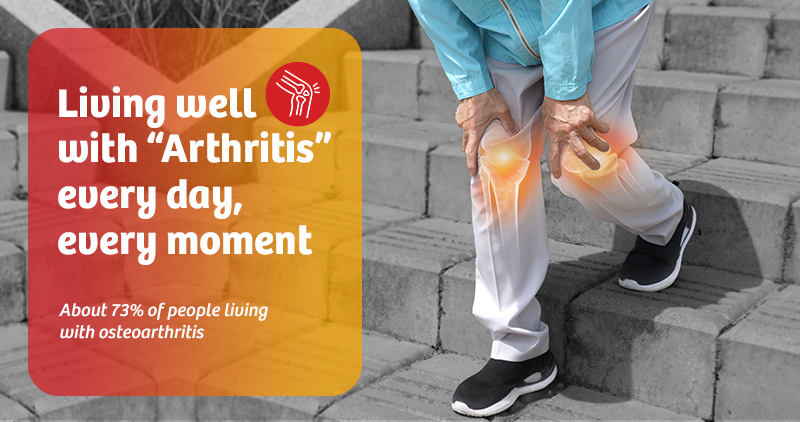Arthritis is a common condition that affects millions of people worldwide.
About 73% of people living with osteoarthritis are older than 55 years, and 60% are female.
With a prevalence of 365 million, the knee is the most frequently affected joint, followed by the hip and the hand.
Let’s understand various aspects of arthritis, including types, symptoms, causes, treatments, and lifestyle modifications, through FAQs.
What is arthritis?
Arthritis is a disease that causes damage to your joints. Joints are places in your body where two bones meet. Some joints naturally wear down as you age. Many people develop arthritis after that normal, lifelong wear and tear. Some types of arthritis happen after injuries that damage a joint. Certain health conditions also cause arthritis.
What are the different types of arthritis?
- Osteoarthritis (OA): The most common type, caused by wear and tear on joints.
- Rheumatoid Arthritis (RA): An autoimmune condition where the immune system attacks the joints.
- Psoriatic Arthritis: Associated with psoriasis, which affects joints and tendons.
- Gout: Caused by the accumulation of uric acid crystals in the joints, leading to sudden and severe pain.
- Ankylosing Spondylitis: A type of inflammatory arthritis primarily affecting the spine.
- Juvenile Arthritis: A term for various types of arthritis that affect children.
What are the common symptoms of arthritis?
- Joint pain and tenderness
- Swelling and inflammation
- Stiffness, especially in the morning or after periods of inactivity
- Reduced range of motion
- Fatigue and general malaise
What causes arthritis?
The causes of arthritis vary depending on the type. Common factors include:
- Genetics: Family history can increase the risk of certain types of arthritis.
- Age: The risk increases with age, particularly for osteoarthritis.
- Injury: Previous joint injuries can lead to arthritis later in life.
- Infection: Some types of arthritis can triggered by infections.
- Autoimmune Disorders: Conditions like RA are caused by the immune system attacking the body’s tissues.
How is arthritis diagnosed?
- Diagnosis typically involves:
- Medical History: Discussing symptoms and family history.
- Physical Examination: Assessing joint tenderness, swelling, and range of motion.
- Imaging Tests: X-rays, MRI, or ultrasound may used to visualise joint damage.
- Laboratory Tests: Blood tests can help detect markers of inflammation or autoimmune disorders.
What treatments are available for arthritis?
Medications & Exercise
Exercise: Tailored exercise programs can strengthen muscles around joints and improve flexibility.
Occupational Therapy: Helps with daily activities and may provide adaptive devices.
Lifestyle Modifications :
Weight Management: Reducing weight can alleviate stress on weight-bearing joints.
Diet: Anti-inflammatory diets rich in omega-3 fatty acids, fruits, and vegetables may help.
Hot and Cold Therapy: Applying heat or cold packs can provide relief.
Surgery
In severe cases, surgical options may include:
- Arthroscopy: Minimally invasive surgery to remove damaged tissue.
- Joint Replacement: Replacing damaged joints with artificial ones, commonly in hips and knees.
When should you see a doctor for arthritis?
Consult an expert if you experience:
- Persistent joint pain or swelling.
- Stiffness that lasts more than 30 minutes after waking.
- Difficulty performing daily activities.
- Symptoms that worsen or do not improve with over-the-counter treatments.
Best arthritis care in Ahmedabad.
In a nutshell :
While arthritis is a chronic condition, many people manage their symptoms effectively through medical treatments, lifestyle changes, and supportive therapies. Early diagnosis and intervention can lead to better outcomes. At KD Hospital, we have a dedicated team of doctors for Orthopedic treatment related to knee, hip, shoulder, and upper limbs, with state-of-the-art facilities and care.

